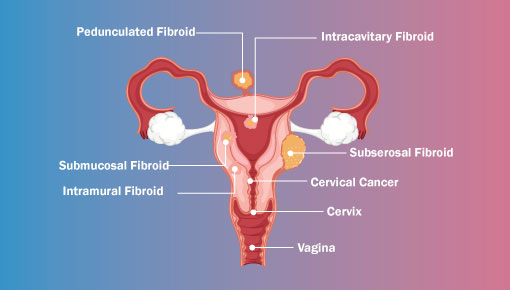Gynecologic Cancers

What is Gynecologic Cancers?
When it comes to reproductive organs in women, caution is vital. Cancer that develops in the reproductive organs of a woman is termed gynecological cancers. Doctors may find gynecological cancers in various places of a woman’s reproductive parts such as the cervix, ovary, uterus, etc.
You must keep track of your body so that you can immediately seek help from professionals when you experience any unusual changes in the body. Everyone may not have the same symptoms of gynecological cancers.
Gynecological cancers are divided into six types, out of which three types are widespread, and the other three are very rarely seen.
Everything You Need to Know About Gynecologic Cancers
Types| When to see | Causes | Symptoms | Risk Factors| Screening Tests | Diagnosis | Treatment
Gynecologic Cancers Types
There are six types of gynecological cancers that are detected in women. Out of the six types of cancers, doctors find the three classes to be ubiquitous, and the rest are sporadic. Each type of cancer is unique and has its symptoms and signs.
Every woman is at risk of having gynecological cancers. The risk of getting affected by this cancer increases as the age increases. Treatment might prove to be effective if it is found at an early stage.
The six types of gynecological cancers are:
1. Uterine cancer
Women have a pear-shaped organ in the body known as the uterus. This is the area where the growth of the baby takes place. It is one of the most common types of cancer that is found in women. The chances of having this cancer increase with diabetes, obesity, and frequent estrogen use, especially without progesterone, and hypertension.
The sub-division of uterine cancers are endometrial stromal tumors, endometrial cancers, and uterine sarcomas. Doctors find endometrial cancer to be the most common type of cancer in the uterus.
If detected and diagnosed at a very early stage, endometrial cancer can be curable. It is treated by laparoscopic surgery, which is a minimally invasive surgery. The time taken for this surgery is a hospital stay of only 2-3 days. Some patients require post-surgery treatment. The post-surgery treatment requires either radiotherapy or a combination of chemotherapy and radiotherapy both.
2. Cervical cancer
This is another kind of gynecological cancer, which is also very common. Women in large numbers are affected by this kind of cancer all over the world. They often reach advanced stages because the awareness regarding this cancer is significantly less, and the screening facilities are also very poor. Human Papillomavirus or HPV infection is a common cause of cervical cancers.
Doctors suggest PAP tests or regular cancer screenings for detecting HPV. It may help to detect cervical cancer at an early stage. Early-stage detection helps to treat the tumor by radical surgery alone. If the cancer is detected at an advanced stage, it may require radiation and chemotherapy.
A very effective way to prevent this type of cancer is through the process of vaccination. This vaccination must be given before young girls are sexually active. The method of immunization is also useful in the case of other kinds of cervical cancers.
3. Ovarian cancer
Another most commonly detected gynecological cancer is ovarian cancer. The three kinds of ovarian cancer are stromal cell cancer, epithelial ovarian cancer, and germ cell cancer. Among all these cancers, epithelial cancer is the most common one. 85% of ovarian cancers are epithelial ovarian cancer.
Epithelial ovarian tumors that are benign in nature are cured by surgery, and the ones that are malignant are treated by chemotherapy or cytoreductive tumor surgery. An essential fact that you must know about epithelial ovarian cancers is that they can reoccur in advanced stages.
Younger individuals are found suffering from germ cell tumors, which is a form of ovarian cancer. 95% of the germ cell tumors are cured by surgery. Some of the cases require chemotherapy. Doctors often prefer fertility preservation therapy to treat young patients suffering from germ cell tumors.
Out of all the ovarian cancers, stromal cell cancer is the most slow-growing. This kind of cancer is treated with surgery.
4. Vulvar cancer
This is a sporadic form of gynecological cancer. The external genitalia of the female is mostly affected by vulvar cancer. It is very commonly detected in women who are elderly. This type of cancer is mostly curable. Doctors might perform radical surgery to treat vulvar cancer. Sometimes radiation therapy and chemotherapy are also needed.
5. Vaginal cancer
The other rare form of cancer is vaginal cancer. Women who are above the age of 50 years are mostly affected by this kind of cancer. In the case of vaginal cancer, Human Papillomavirus, or HPV injection, is responsible. Doctors perform radical surgery to treat vulvar cancer, and sometimes chemotherapy or radiotherapy is also needed.
6. Gestational trophoblastic tumor
GTD or gestational trophoblastic disease is a term given to a group of tumors that are related to pregnancy. These tumors are sporadic and subdivided into five more types. One of the classes is benign, and the other four types are malignant.
During the time of pregnancy, the tumors start growing in the layers of cells, which are known as trophoblast. Doctors use chemotherapy to treat these tumors. They are mostly curable.
When to see a doctor
There is no way by which you can be sure that you will be getting gynecological cancer. You need first to recognize the symptoms and signs of gynecological cancers before you seek any help.
If you have abnormal bleeding from the vagina, talk to your doctor immediately. After menopause, any sort of vaginal bleeding needs treatment. You must ask for help from the doctors. If you have not reached the menopause stage but still notice you have heavier periods, which even lasts longer, or in case you are experiencing abnormal bleeding between your cycle, seek medical consultation.
If you experience any of the symptoms or warnings that last for longer and are not usual, you must contact the Dr. Jay Mehta who is is one of the best gynecologic oncologist in Mumbai.
Book Your Consultation Today With an Gynecologic Cancers Specialist in India – Dr Jay Mehta
Gynecologic cancers causes
There are many causes of gynecological cancers. Some of the reasons are:
- Diabetes
- History of menstrual and reproductive problems includes having issues while conceiving or starting menstruation before the age of 12 and menopause after 55.
- Family history
- Smoking
- Older age
- Weak immune system
- HIV infection
- HPV infection
- Obesity
- High-fat diet
- Usage of fertility drugs or oral birth control drugs
- Any kind of prior radiation performed in the pelvic area
- Estrogen therapy
Gynecologic Cancer Symptoms
The symptoms of all gynecological cancers are not the same. Some of the symptoms might be similar, but not all. It mainly varies depending on the individual, the kind of cancer, and its stage. In many cases, it is seen that some women may not even experience any such symptoms. Some of the symptoms of cervical cancer are:
- Pelvic area pain
- Abnormal bleeding from the vagina
- Discharge from the vagina is unusual
Symptoms of endometrial cancer are:
- Pain during sex
- Pain during urination
- Abnormal bleeding from the vagina
- Pressure, pain, or lump in the lower belly
- Weight loss that is unexplained
Symptoms of ovarian cancer are:
- Fatigue
- Constipation
- Diarrhea
- Loss of appetite
- Nausea
- Heartburn
- Indigestion
- Gas
- Discomfort in the abdomen
- Bleeding from the vagina
- Backache
- Weight loss that is unexplained
- Frequent urge to urinate
- Fluid buildup responsible for shortness of breath
Symptoms of vaginal cancer are:
- Constipation
- A growth or lump
- Abnormal discharge
- Vaginal bleeding that is abnormal
- Pain sensation during urination
- Pain sensation during sex
- Pelvic pain which occurs frequently
- A feeling of burning or itching in the vulvar area
- A sore that is open and lasted for more than one month
- The white color of the skin on the vulva
- A rough sensation of the skin on the vulva
Symptoms of uterine cancer are:
- Abnormal bleeding from the vagina
- Painful urination
- Difficulty while urinating
- Frequent urge for urination
- Feeling of pain during sex
- Pelvic pain that is frequent
Symptoms of fallopian tube cancer are:
- Vaginal bleeding that is not usual
- Pelvic pressure or pain
- Mass or a lump found in the area of the pelvic
- Vaginal discharge that is not usual
Risk factors for gynecologic cancers
There are various risk factors for gynecological cancers. It all depends upon the age and the kind of cancer. Some of the risk factors are:
- Diabetes
- Obesity
- A weak immune system
- Smoking
- History of gynecologic cancer
Screening tests for gynecological cancers
The screening tests for gynecological cancers are:
- Colposcopy
- Cervicography
- HPV testing
- Polarprobe or Tuscan
- Ovarian carcinoma screening
- Biochemical markers
- CA125
- Genetic screening
- Proteomic technology
- Examination of the pelvic area
- Ultrasonography
Gynecologic Cancer Diagnosis
If you visit your gynecologist for regular checkups, it will assist in detecting gynecological cancers early. Your doctor will look for irregularities or unusual masses on the vulva, cervix, ovaries, uterus, and vagina during the pelvic exam. You will also go through a PAP test to check whether there is any presence of cells that are cancerous on the cervix or not.
If your gynecologist suspects any sign of cancer, specific diagnostic imaging tests will be performed, which include:
- An ultrasound
- MRI or CT Scan
These tests will help the gynecologists to determine the extent of gynecological cancer. Doctors may also perform some additional methods to diagnose or screen gynecological cancer. Some of them are:
- Colposcopy
- D&C or Dilation and curettage
- LEEP or Loop Electrosurgical Excision Procedure
- Biopsy
- Laparoscopy
- HE4, CA-125, OVA 1 blood tests
Gynecologic cancer treatment in Mumbai
The treatments for gynecological cancers are done with advanced technology. During the process, doctors suggest compassionate care for women. The therapy will basically depend upon the extent of the cancer, your overall health, and your strength of tolerance for different therapies you will undergo during the procedure. Some of the treatment options are:
- Surgery
Doctors prefer surgery as it is the primary treatment considered in the case of gynecological cancer. It helps remove the tumor, the organs that are affected, and the groin lymph nodes or the para-aortic lymph nodes. Gynecologic oncologists, who are specially trained using minimally invasive surgical instruments to remove the tumor. It helps in faster healing and also causes minimum pain.
- Radiation Therapy
Cancer cells are killed, and tumors are shrunk using radiation therapy. The radioactive waves help to conduct this procedure.
- Chemotherapy
The cancer cells are killed by consuming medicines orally or taking medications intravenously. These are popularly known as chemotherapy.
- Hormone therapy
This therapy focuses on stopping the growth of the cancer cells and kills them.
- Intraperitoneal chemotherapy
This chemotherapy involves administering directly into the cavity of the abdomen. This therapy is improving day by day, and patients are also improving for long-term survival.
- Clinical trials
Through these studies, researchers can find effective treatments that will help to cure gynecological cancers.
Gynecological cancers are curable when diagnosed at an early stage. It is a worldwide issue nowadays. Researchers are developing drugs that can deal with this cancer even at an advanced stage.

Dr. Jay Mehta
MBBS, DNB – Obstetrics & Gynecology
IVF & Endometriosis Specialist, Laparoscopic Surgeon (Obs & Gyn)
Dr. Jay Mehta is a renowned IVF specialist and fertility-preserving surgeon in Mumbai, India. He is the Director of Shree IVF and Endometriosis Clinic, as well as the Director of Uterine Transplant in Global Hospitals, Mumbai. He is a leading laparoscopic gynecologist in India for endometriosis and adenomyosis..
He is a well-known Fertility and IVF Specialist and also among few doctors in the country who specializes in Embryology and Andrology. He operates India’s major cities including Mumbai, Pune, Chennai, Hyderabad, Bangalore, Ahmedabad, Agra, Delhi etc.
To book an appointment, call: 1800-268-4000 or fill out our contact form

Google Reviews

Ankita Katyal

I am incredibly grateful for Dr. Jay's exceptional support throughout my IVF journey. Dr Jay has been like God sent an Angel for us. From our very first meeting, it was clear that Dr. Jay was not only a highly skilled and knowledgeable professional but also someone who genuinely cared about my well-being.
From my first meeting, he was very clear transparent, and straightforward about my protocol, treatment line, and success rate. After two difficult IVF cycles that failed, I was beginning to lose hope.
However, Dr. Jay’s unwavering encouragement and meticulous care helped me stay positive and focused. Thanks to God and of course to his expertise and dedication, WE FINALLY ACHIEVED SUCCESS!!!!!

Krish A

Dr Jay Mehta is the best Fertility doctor. I am glad to have IVF done with Jay sir.
This unit is very ethical and very honest at work. In my previous IVF cycle, I did not have embryos in Chennai. I was here and Dr and team had told me not to worry. I was given end to end transparency about my embryos and I was lucky to become pregnant in the 1st cycle here, though I was told that the success rate will be about 25 to 30%.
IVF space is competitive, but these guys don't do any Ads on Google. And still if you search, Dr Jay is ranked no.1. I was extremely impressed with that and I am happy that I took a call to travel to Mumbai from Chennai.
I am thankful to the entire team for handling my case nicely. And May God shower the team with his choicest blessings.

Forum Shah

I visited 3 years back for my IVF treatment at that time and also got good treatment with Dr. Jay Mehta … the best part is he would tell me straight away whatever the cause and outcome would be.
This time also I came for Endometriosis treatment n within 3-4 days decided to get operated as there was no looking back as I trust him for his treatment. Thank you Dr once again for the right advice 😊

Deepak Jagadale

Dr Jay Mehta and team are simply excellent people and brilliant outcomes in Fertility services. Very very honest and humble doctor.
Thank you for the valuable guidance during the IVF process and the excellent and no hidden costs during IVF procedure. For middle class people it's a big relief.

Avinash Jain

Dr. Jay Mehta is a result-oriented specialist in his field and the best we could ask for, in a Metro city. His line of treatment for IVF is different from other IVF clinics.
The support provided by doctors and staff as well as all other attending doctors is phenomenal. We are very satisfied and will also highly recommend to others the IVF treatment at Shree IVF Clinic Mumbai.

Vijaya Garg

Dr. Jay Mehta is one of the best gynaecologist doctor of our India. I trust him faithfully and would like to recommend each and every one that don't waste time moving here and there to another doctorand .
I m sharing my experience I wasted my time mand oney by moving from one doctor to other and my problem was unsolved I'm thankful to Dr. Priyanka Shukla mam of trident hospital for suggesting Dr. Jay Mehta sir for my treatment . Now I'm pain-free...Thank you Dr. Jay Mehta sir... you are really my Boley baba shiv shsmbu. I m thankful to all the staff members of Shree IVF hospital
Blogs

Best Sex Position to Get Pregnant Naturally
Best positions to get pregnant—try missionary or using pillows under your hips. Small changes can boost your chances of conceiving

Importance of the Fallopian Tubes in Fertility
Blocked fallopian tubes can prevent natural pregnancy. Understand their role and explore solutions for boosting your fertility
Videos

Best Sex Position to Get Pregnant Naturally
Best positions to get pregnant—try missionary or using pillows under your hips. Small changes can boost your chances of conceiving

Importance of the Fallopian Tubes in Fertility
Blocked fallopian tubes can prevent natural pregnancy. Understand their role and explore solutions for boosting your fertility

